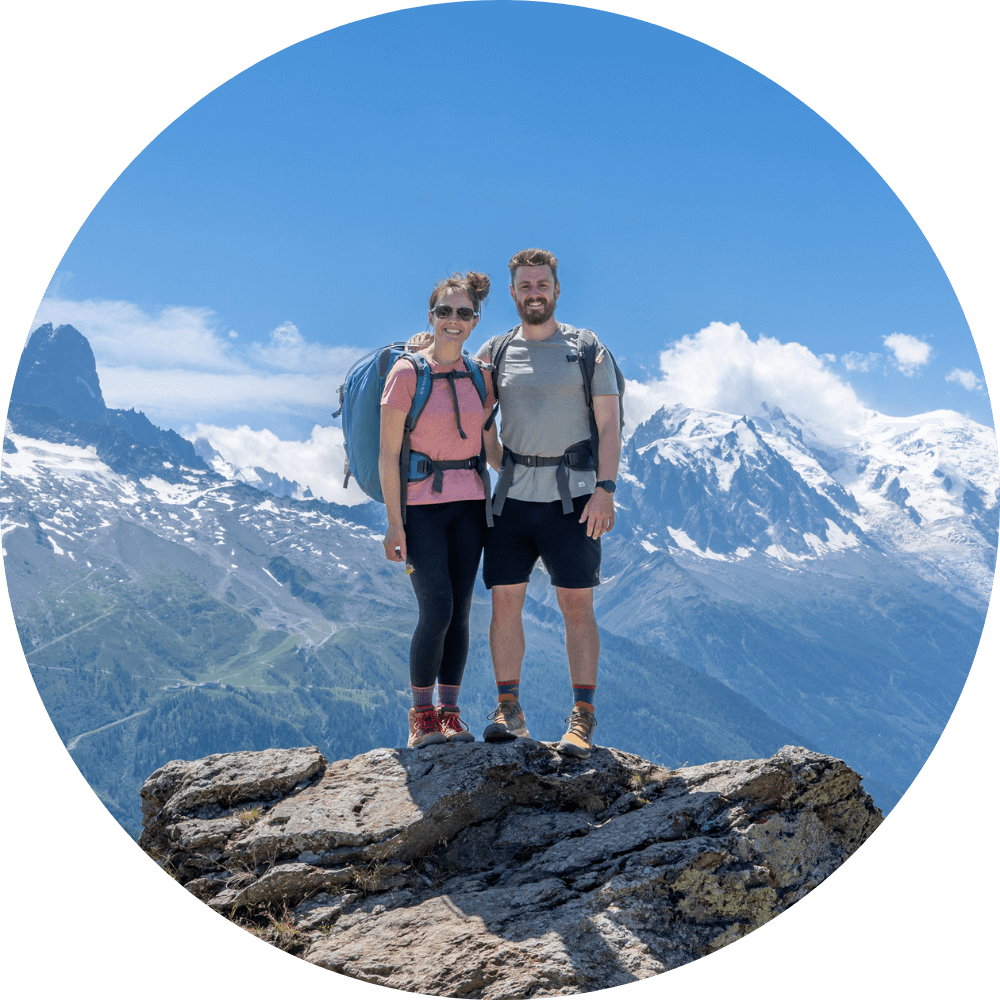If you’re planning to visit Grand Canyon South Rim for the first time, one of the most important questions you should have is: when is the best time of year to go? Things like hotel costs, weather, hiking conditions and crowds can play a big role in your overall enjoyment in the park, so it’s important to pick your dates well. We’ve visited South Rim in fall and winter, and the seasonal differences surprised us.
In this guide we explain what you can expect at Grand Canyon South Rim if you visit in spring, summer, fall or winter, based on our experiences. Our guide is about when to visit South Rim only because just 10% of all visitors to the national park go to North Rim, and it’s only open mid-May through mid-October anyway. Read more about us.
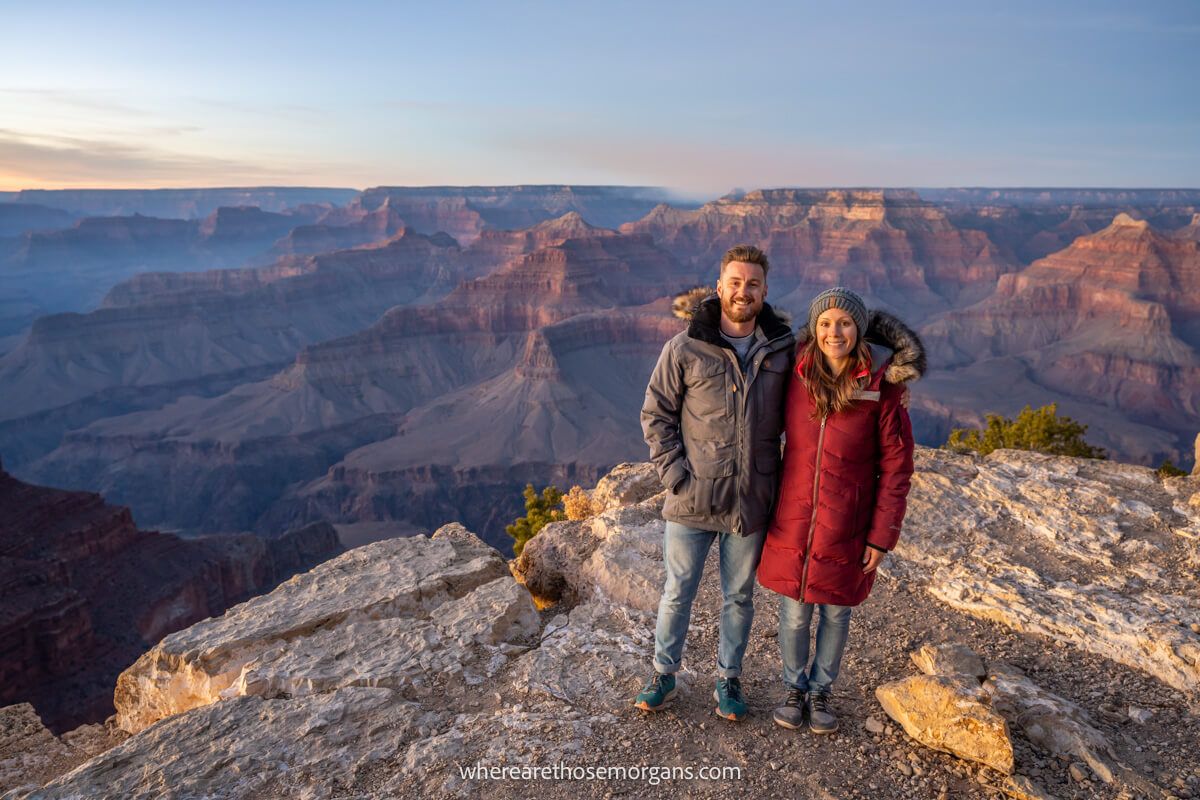
Our first trip to Grand Canyon South Rim was in early November 2019. It was busier and more expensive than we expected considering it was late fall. Most lodging options were booked up or cost too much to book last minute, the trails and photo spots were jam-packed and the shuttle buses had lines. But daytime temperatures were near perfect.
Then we revisited South Rim again in December 2021 and we couldn’t believe how much quieter it was. We easily booked last minute hotel rooms, sunrise and sunset photo spots were empty, and we barely saw anyone else when we day hiked South Kaibab to Bright Angel. But winter weather is real: the first day we had beautiful sunshine, the second day we had a blizzard! Okay, let’s begin!
Note: Our content is reader supported and contains affiliate links. If you make a purchase through one of these links, we may earn a small commission at no extra cost to you and it helps us keep this site running.
Grand canyon Planning
📖 Ultimate Guidebook: Get our complete 37-page Grand Canyon PDF with everything you need.
📞 Personalized Grand Canyon Planning: Book a call with Mark to have your questions answered and plan the perfect itinerary.
💡 Still Planning? Read our essential first-timer’s guide to visiting Grand Canyon.
The Quick Answer
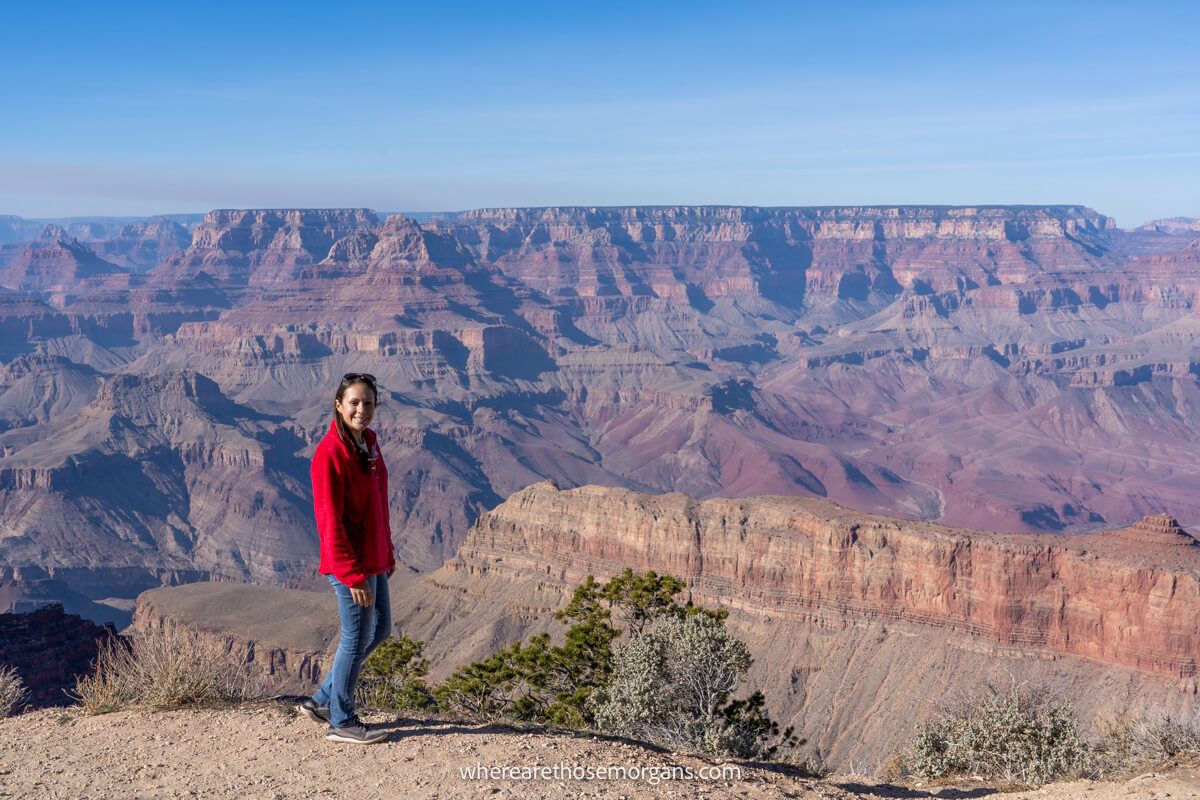
If you’re in a hurry and just want a broad top level answer, we think October-April are the best months to visit Grand Canyon South Rim. More specifically: anytime from November-March works if you’re planning a serious hike into the canyon, but if you’ll just be sightseeing you might be better off visiting in October or April when temperatures are more comfortable.
Why are the cooler months better? Because the park receives fewer visitors, hotels are cheaper, the Grand Canyon’s popular trails are quieter and it’s safer to hike in the cold temperatures. Visiting in May-September means huge crowds, expensive lodging, dangerously hot temperatures (especially hiking down into the canyon) and long lines for shuttle buses.
We know families with kids might not have any other choice, but summer would be the last time we’d book another trip to the Grand Canyon. In fact, we just flat out wouldn’t go in summer because we wouldn’t be able to hike.
Now, if you’re interested in learning about the not-so-quick-answer, let’s dive in!
Monthly Visitors
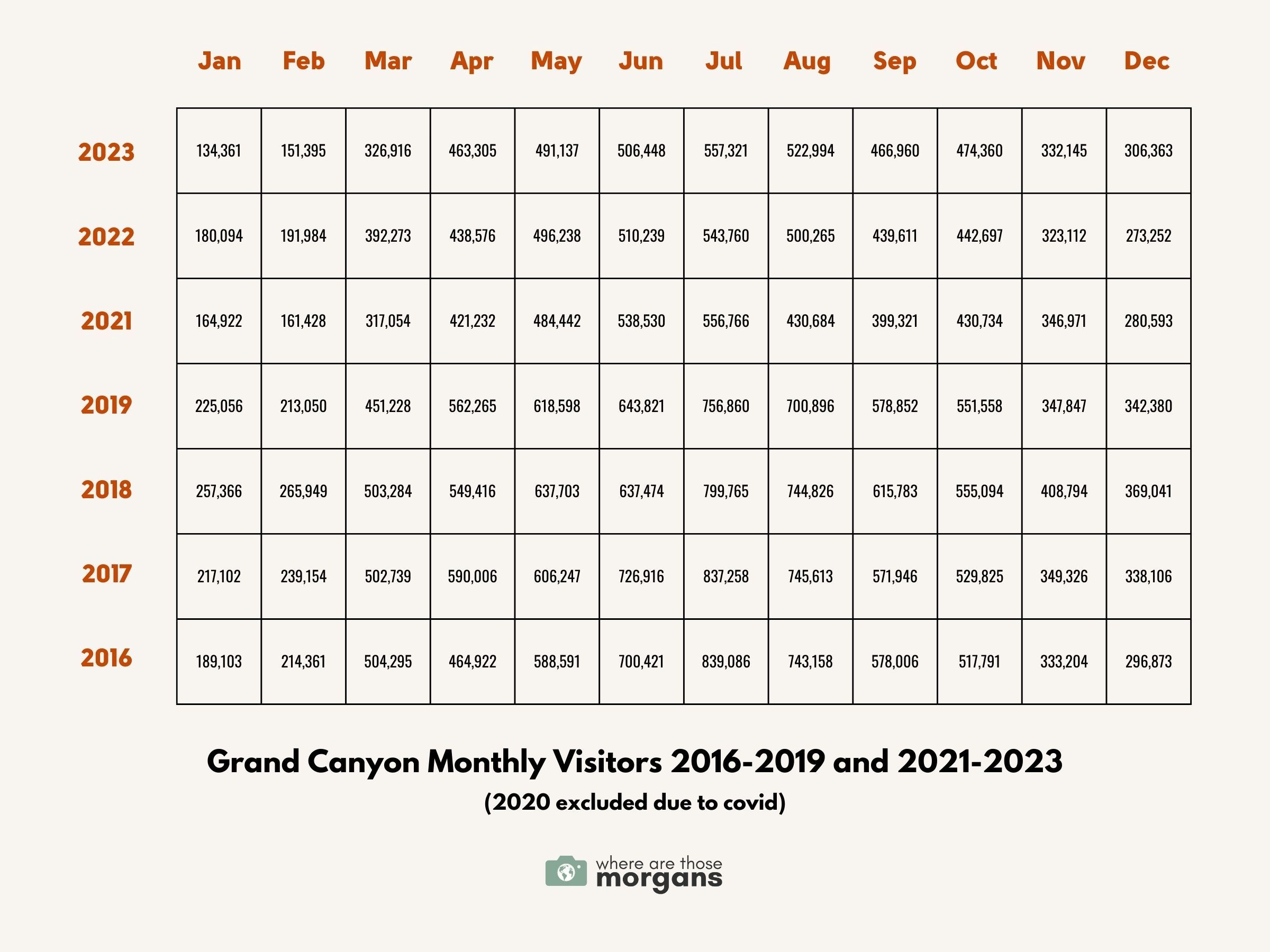
Okay, the first thing you should consider is how many people visit Grand Canyon South Rim each month. This is important because South Rim’s touristy area is smaller than you might imagine, lodging options only have a certain capacity and there are only so many shuttle buses.
If you visit South Rim in July with 800,000 other tourists (that’s 25,800 people each day), you might not have the experience you expect. Where are they all staying? What are they all doing during the day? Which restaurants are they all eating in? Will they be able to get parked at viewpoints?
Conversely, if you visited in January with 180,000 others (that’s 5,800 people each day), you’re going to have a completely different experience. Yes, it’s going to be cold, but the benefits are clear to see. Empty trails and photo spots, along with lower hotel occupancy rates driving bargain-bin lodging prices are a huge win.
Even though it was only a month between our trips in November and December respectively, we noticed a massive difference in crowd numbers, temperatures and hotel room availability.
Weather Conditions At Grand Canyon South Rim
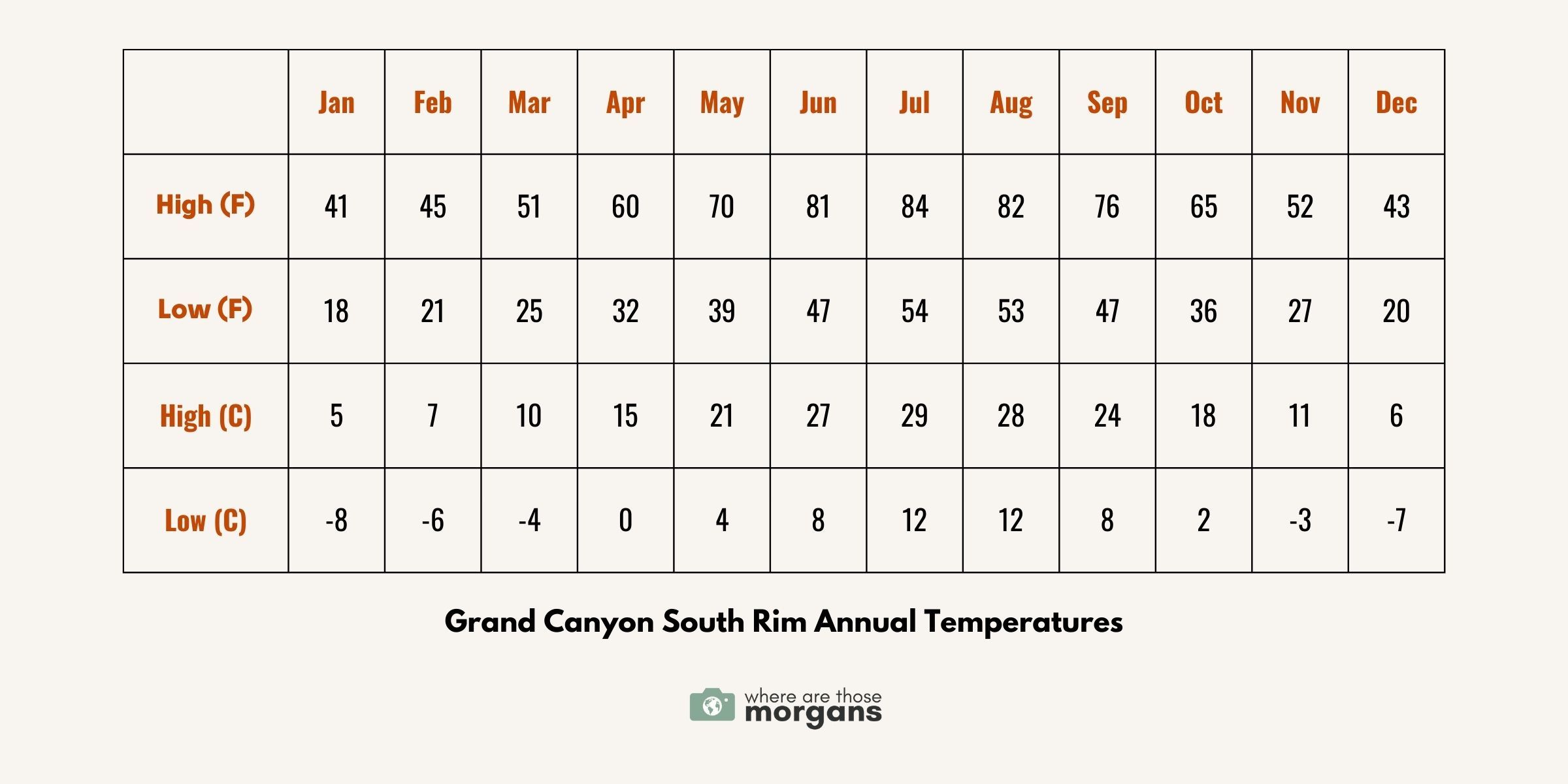
Outside of crowds, we think weather is the next most important thing to consider. South Rim is 7,000 feet above sea level, so the sun’s UV rays are much stronger in summer and temperatures are much colder in winter because air cools as it rises. This is one of the reasons spring and fall are good times to visit the Grand Canyon.
The American southwest is hot in summer, but the Grand Canyon is different because temperatures and weather reports can be misleading. It might say 85 F at 7,000 feet on South Rim, but the temperature is significantly higher at the bottom of the canyon.
Each year there are dozens of fatalities or rescues from hiking trails inside the canyon. This is why the NPS strongly advises against hiking down any trail leading into the canyon in summer. And that’s why we suggest only visiting between November-March if you’re planning a serious attempt on a hike like South Kaibab or Bright Angel.
There’s a reason crowds thin and hotels charge less in winter: It’s cold! Trust us, we know. The mornings and evenings in particular can be brutal, which we found out at sunrise and sunset photo shoots. But you might also get lucky with weather. We had a spectacular day when we hiked Rim-to-River in December. But the next day it was a total whiteout so we lost a full day from our Grand Canyon itinerary.
Key Takeaways
- June, July and August are the hottest months of the year.
- December, January and February are the coldest months.
- Mornings and evenings are cold from October through May.
- Daytime temperatures are comfortable April, May, September and October.
- It’s not safe to hike into the canyon May-September.
What We Consider
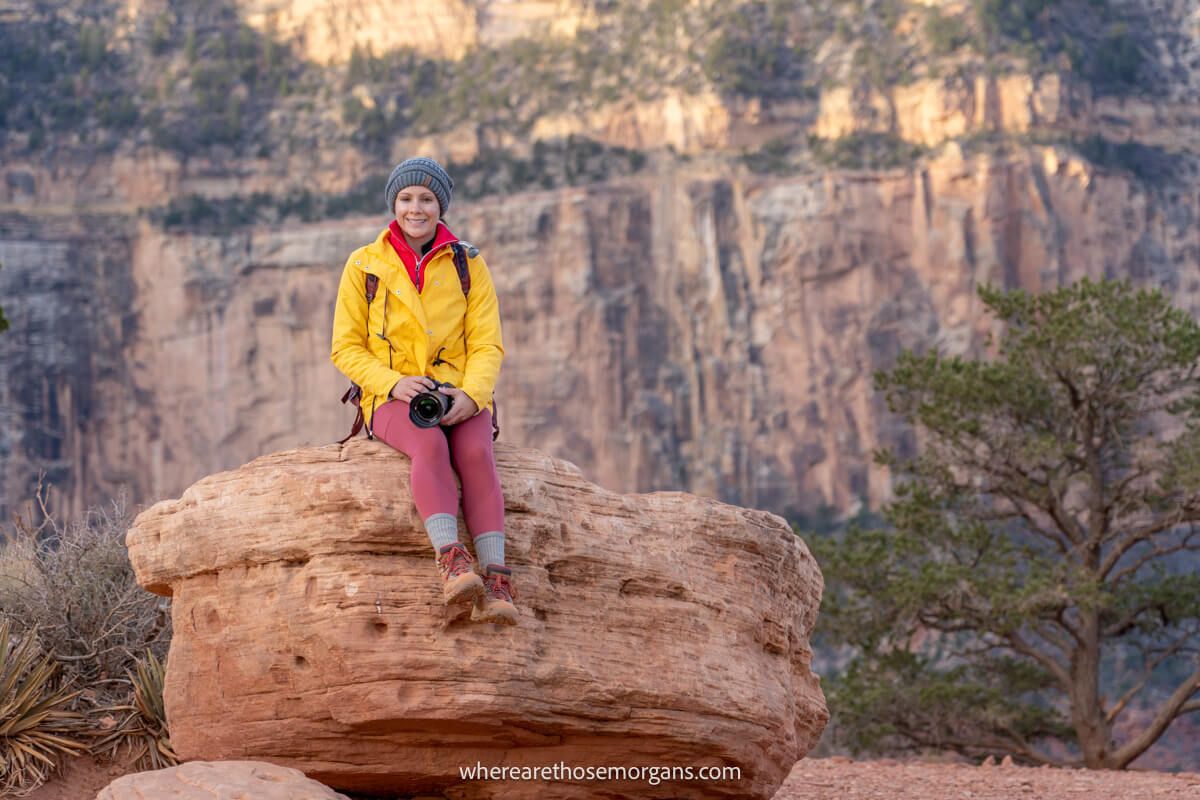
So what exactly do we think about when we visit any new place like Grand Canyon South Rim? Let’s take a look:
- Crowds – Will the park be quiet or overcrowded? How important is it to avoid crowds?
- Cost – How much do we want to spend? Will the price of a hotel room, flights and a rental car justify weather and hiking conditions?
- Weather – Are temperatures important for this trip? Will conditions impact hikes or photography?
- Hiking – Are trails open year round? How busy are they in each season?
- Photography – Are there any photo-specific considerations at different times of year?
- Location – Which seasons are best to visit the other places on our itinerary near the Grand Canyon?
- Specifics – What’s unique to this park? Do we need to book things in advance?
This is obviously an over-the-top way to analyze every aspect of planning a trip. And you don’t need to be that intense! But they’re all great questions to ask yourself because you might be able to narrow things down more than you expect. Okay, now let’s get into the seasons.
Need help planning your trip to Grand Canyon?
Our popular Grand Canyon travel guidebook helps you with planning every aspect of your visit to South Rim, including the best viewpoints and hikes, where to eat and stay, itinerary ideas and map!
View Guidebook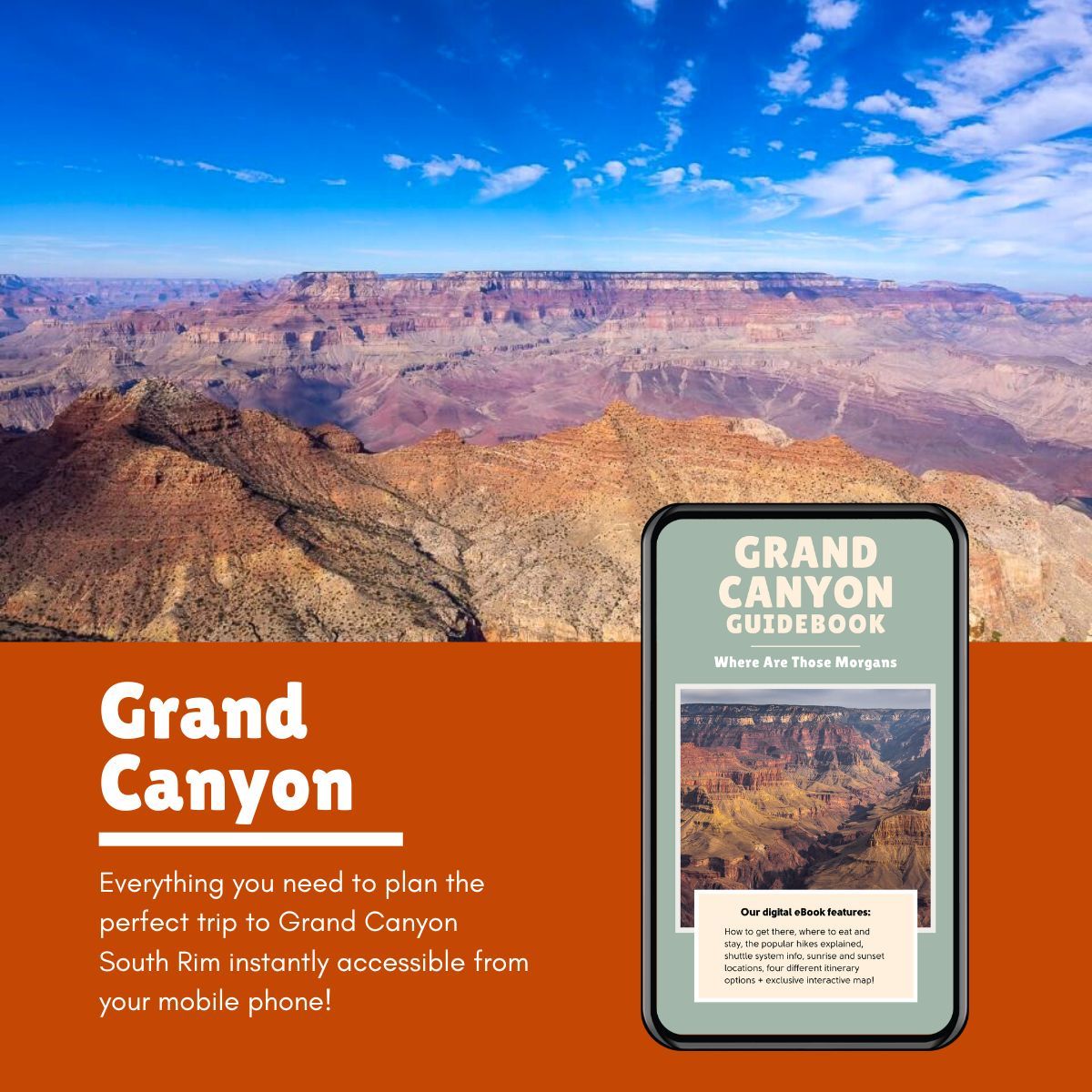
Spring
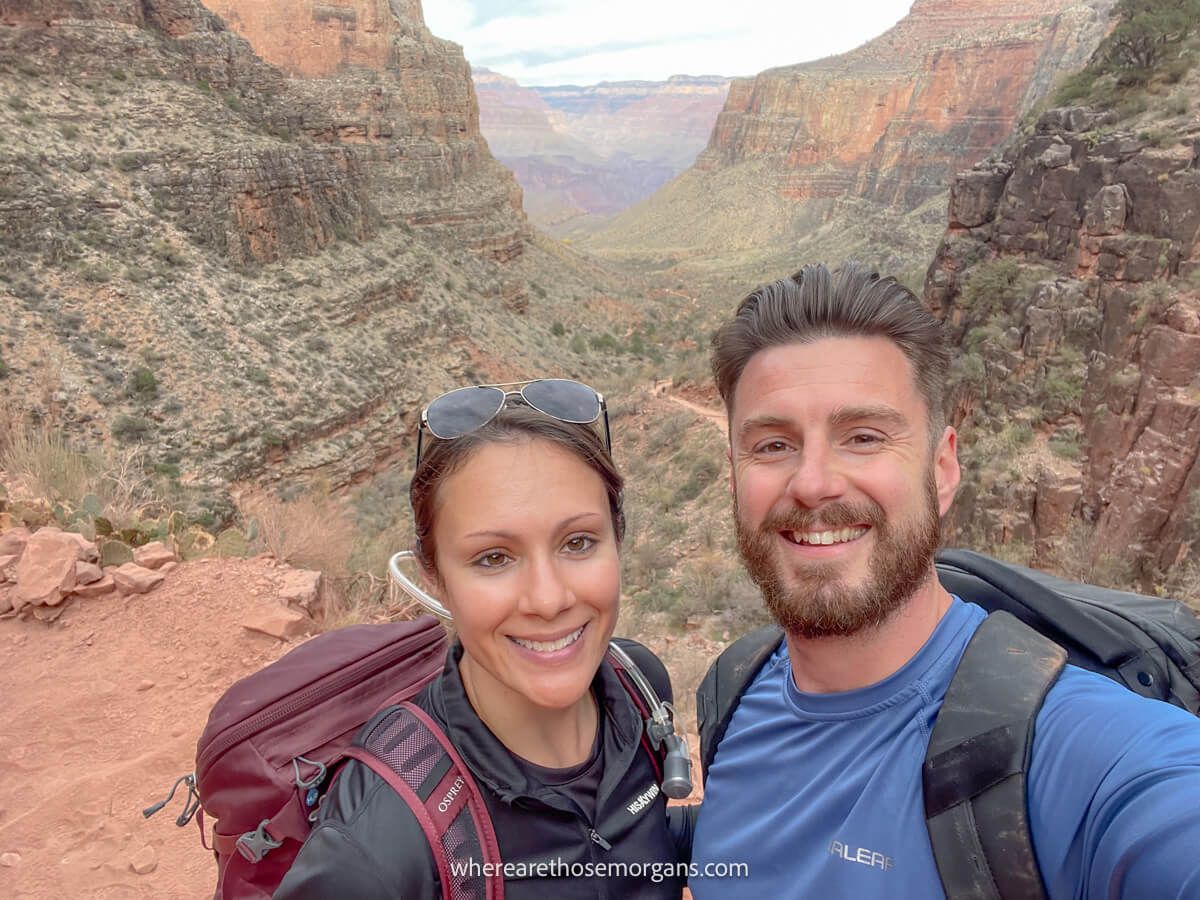
We think spring is a good time to visit Grand Canyon South Rim because it has a reasonable balance between costs, weather and crowds. If you’ll be hiking, visit earlier in spring. Whereas if you just want to see the viewpoints and photo spots, April and May will be warmer.
Take a closer look at the monthly visitor numbers in our earlier chart and you’ll see spring has the second highest amount of tourists. The sudden high demand after a slow winter season mean hotels and rental car companies start ramping up their prices. Therefore, in our opinion spring is the third best season to visit, or second worst depending on how you look at it!
March Weather
Weather conditions in general begin to warm but the mornings and evenings are still very cold. Ground snow can cause fog but it usually burns away by morning. Winds can get a little gusty at times.
- Average High – 51°F (10°C)
- Average Low – 25°F (-4°C)
- Precipitation – 1.38 inches
- Snowfall – Expected
April Weather
Grand Canyon’s weather in April is warmer and more sunny than March, but snow can continue to fall and the occasional sub-zero temperature will be recorded. Expect winds to pick up, but overall it’s a comfortable month.
- Average High – 60°F (15°C)
- Average Low – 32°F (0°C)
- Precipitation – 0.93 inches
- Snowfall – Occasional
May Weather
May is one of the best months for weather conditions at Grand Canyon South Rim. Along with June, May accounts for the driest time of year with very low relative humidity and daytime temperatures are great on the rim. It can be breezy and gusty at times, but overall it’s very comfortable.
- Average High – 70°F (21°C)
- Average Low – 39°F (4°C)
- Precipitation – 0.66 inches
- Snowfall – Very unlikely
Here are the pros and cons to visiting Grand Canyon in spring:
Pros
✅ More affordable hotels than summer
✅ Great conditions for hiking early in spring
✅ Mornings and evenings warm later in spring
✅ Less crowded than summer
Cons
❌ Second busiest season overall
❌ Trails get very busy later in spring
❌ Hotels aren’t as cheap as winter
❌ Hotels are more expensive than fall and winter
Summer
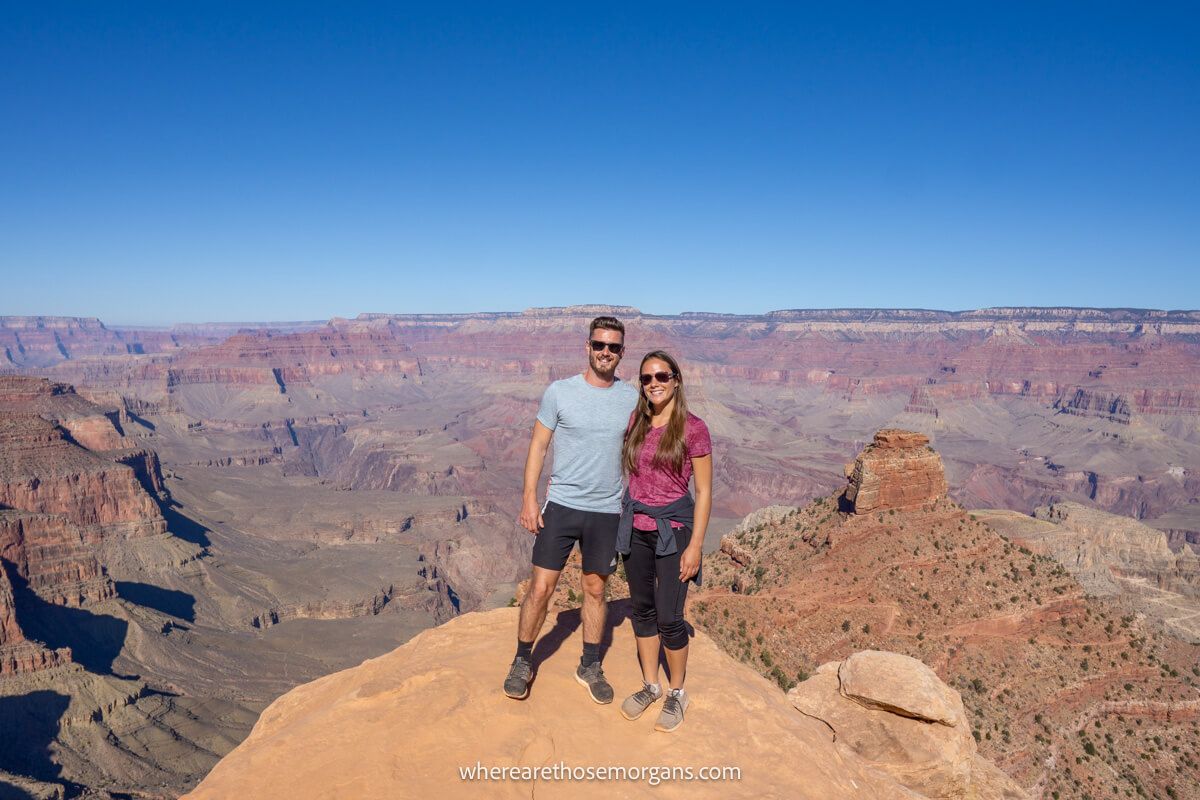
In our opinion the summer months of June, July and August are the worst times of year to visit Grand Canyon South Rim because they’re hot, expensive and overcrowded. We know that’s not what you want to hear if you can only plan around school times, but it’s the truth!
Look, there are some benefits like warmer weather and longer daylight hours if you only plan to hang out on the rim. But everything will cost more, you’ll have to book things well in advance, and you’ll get stuck in lines for shuttle buses and restaurants.
June Weather
June is a transitional month for weather at Grand Canyon South Rim with very warm daytime temperatures, but occasional cool lows and even the odd overnight frost. June is almost as warm as July and August in the day, but it’s noticeably colder in the morning and evening compared to other summer months.
- Average High – 81°F (27°C)
- Average Low – 47°F (8°C)
- Precipitation – 0.42 inches
- Storms – Occasional
July Weather
July is the hottest month of the year but frequent storms are also common. Temperatures easily top 100°F (38°C) down on the canyon floor around Phantom Ranch, so hiking is not a good idea. July also has the warmest mornings and evenings of the year.
- Average High – 84°F (29°C)
- Average Low – 54°F (12°C)
- Precipitation – 1.81 inches
- Storms – Frequent
August Weather
August is almost as hot as July at South Rim but there are even more storms, often major ones causing flash flooding in the Colorado River. Interestingly, it’s the best month for a chance of seeing lightening flash and fork above the canyon, which would make for amazing photography.
- Average High – 82°F (28°C)
- Average Low – 53°F (12°C)
- Precipitation – 2.25 inches
- Storms – Frequent
Here are the pros and cons to visiting Grand Canyon in summer:
Pros
✅ Warm mornings and evenings
✅ Long daylight hours
✅ Great for sunrise and sunset photography
Cons
❌ Hotels most expensive
❌ Need to book months in advance
❌ Long lines at restaurants
❌ Can be dangerously hot during the day
❌ Serious hiking is not recommended
❌ Sunrise and sunset photo spots crowded
❌ Parking at viewpoints is stressful
❌ Lines for Hermits Rest shuttle bus
❌ Frequent storms lead to flash floods
Fall
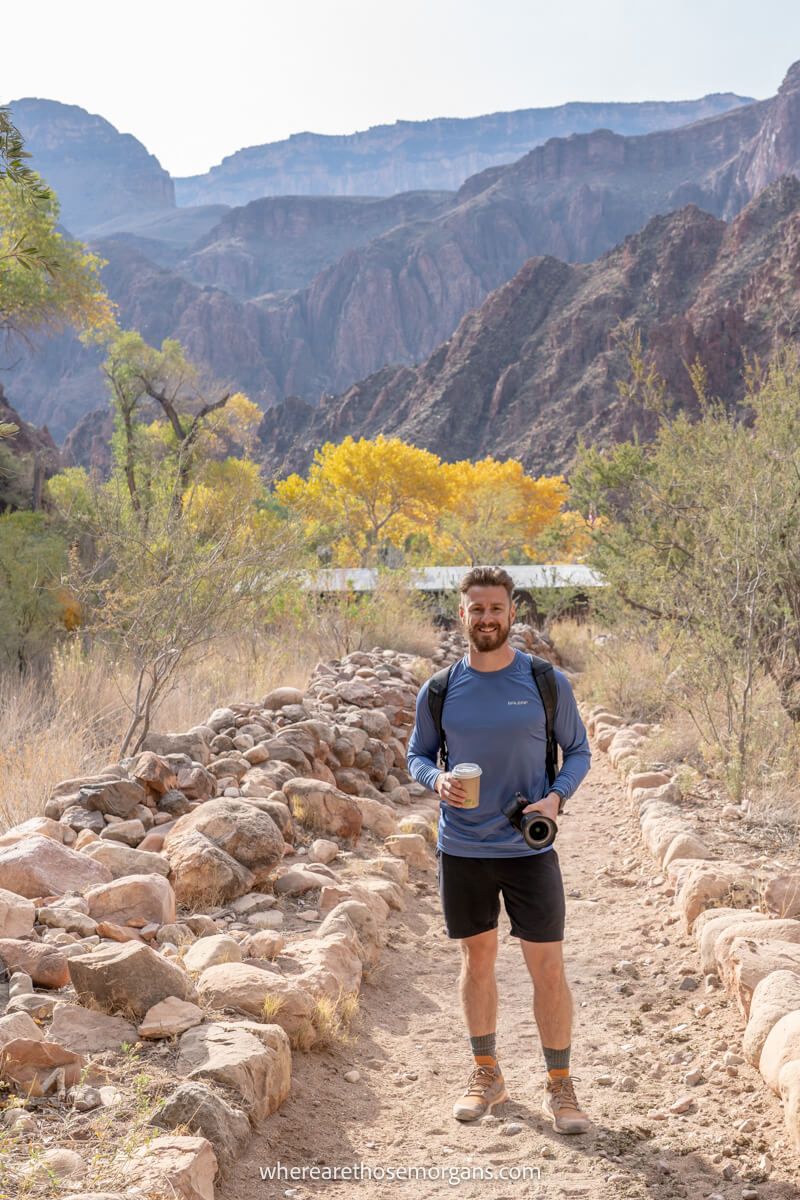
For us, it’s a toss up between fall and winter for the best time to visit Grand Canyon South Rim. With that said, we would only plan to visit later in the fall season between October and the end of November for hiking. If you want to hike Rim-to-Rim, we recommend doing it in the first 2 weeks of October before North Rim closes for the season.
September and October are still busy, although not quite as busy as their counterparts in spring. Whereas November has a bunch of benefits with the only real downside being that temperatures plummet. If you don’t mind the cold, November might just be the best month of the year to visit the Grand Canyon.
September Weather
September is the month with the most changeable weather conditions of the year. High daytime temperatures mix with unexpected storms and even early winter snow is possible (although unlikely).
- Average High – 76°F (24°C)
- Average Low – 47°F (8°C)
- Precipitation – 1.56 inches
- Snowfall – Unlikely
- Storms – Frequent early in month
October Weather
October has pleasant daytime temperatures, but cool early morning and late evening temperatures. It also has low risk of storms or snow, which means you won’t have to worry about plans being interrupted by weather.
- Average High – 65°F (18°C)
- Average Low – 36°F (2°C)
- Precipitation – 1.10 inches
- Snowfall – Infrequent
- Storms – Unlikely
November Weather
Daytime temperatures plummet in November but during the day it’s warm enough to hike in shorts and t-shirts. However, mornings and evenings turn cold and heavy coats are required to stay warm at dawn or dusk on the rim. It’s a great time to hike into the canyon.
- Average High – 52°F (11°C)
- Average Low – 27°F (-3°C)
- Precipitation – 0.94 inches
- Snowfall – Occasional
Here are the pros and cons to visiting Grand Canyon in fall:
Pros
✅ Less busy than spring and summer
✅ Hotels more affordable than spring and summer
✅ Great weather conditions for hiking on the rim
✅ Hiking into the canyon safe later in fall
Cons
❌ Colder mornings and evenings set back in
❌ Not as quiet as winter
❌ Hotels not as cheap as winter
Winter
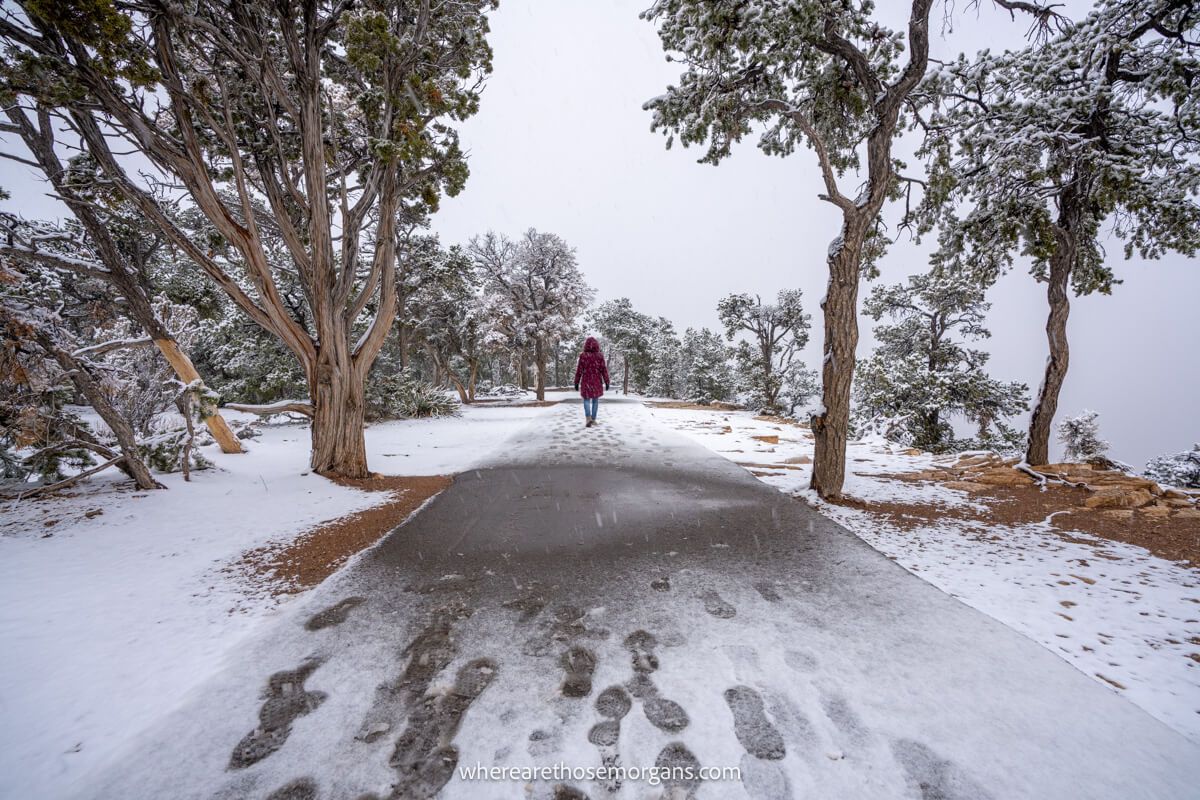
Winter is the best season to visit Grand Canyon South Rim for serious hiking into the canyon because temperatures are safer. But at the same time, snow clouds can roll in and eat up an entire day on your itinerary as we found out during our visit to the Grand Canyon in December. We couldn’t see or do anything, but we got to see the rim covered in snow which was cool.
If you only plan to stick around on the rim, you stand to save a bunch of money, avoid the crowds and you can even drive your own car to the popular viewpoints along Hermit Road. But all this depends on whether you’re willing to put up with the cold. Oh, and another downside for us was a lack of atmosphere in the evenings, but that might not bother you.
December Weather
Frequent snowfall begins in December and it becomes extremely cold in the mornings and evenings. We had one amazing day of winter sun and one total whiteout in the snow, so expect changeable weather and pack accordingly.
- Average High – 43°F (6°C)
- Average Low – 20°F (-7°C)
- Precipitation – 1.64 inches
- Snowfall – Expected
January Weather
January is the coldest month of the year at Grand Canyon South Rim. It has the lowest highs and the lowest lows, so it can be bleak. But on a good day you could have sun and reasonable temperatures along with the freedom of the park because there’s nobody else around.
- Average High – 41°F (5°C)
- Average Low – 18°F (-8°C)
- Precipitation – 1.32 inches
- Snowfall – Expected
February Weather
February is still very cold and frequent snowfall will occur on the rim, but it’s the second quietest month so you’ll still have the freedom of the park. Pack plenty of warm gear but hope for early spring conditions, especially towards the end of the month.
- Average High – 45°F (7°C)
- Average Low – 21°F (-6°C)
- Precipitation – 1.55 inches
- Snowfall – Expected
Here are the pros and cons to visiting Grand Canyon in winter:
Pros
✅ Quietest time of year by far
✅ Hotels extremely affordable
✅ No lines at restaurants
✅ Can drive your own car along Hermit Road
✅ Hiking trails are empty
✅ Safest time to hike into the canyon
✅ Later sunrise time and earlier sunset time
Cons
❌ Freezing cold mornings and evenings
❌ Fewer daylight hours means less time hiking
❌ No atmosphere in the evenings
The Morgan Conclusion
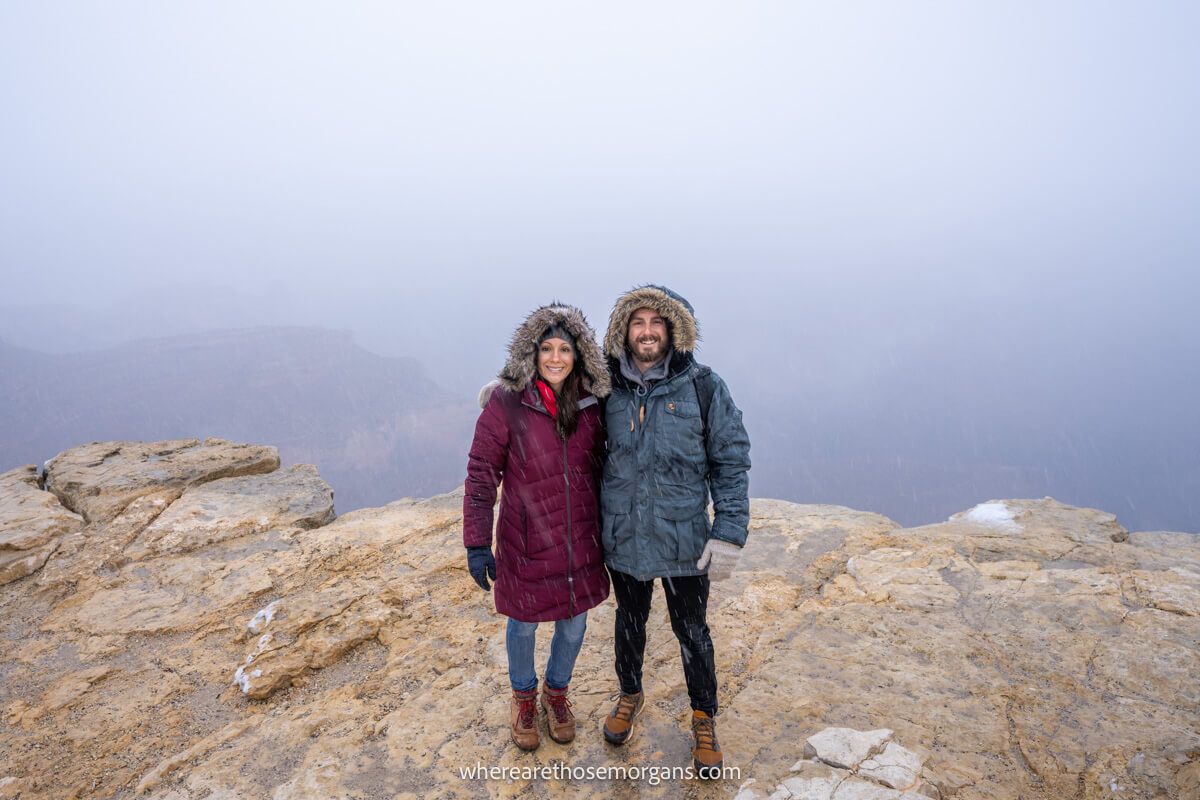
Look, you can go to Grand Canyon South Rim any month of the year and have an amazing experience. But if things like crowds, weather or costs will bother you, pick a month you like the sound of based on what we’ve just explained. And if you plan to hike into the canyon, avoid the summer months.
After visiting in November and December, we’d say November has most of the benefits with the only real downside being cold mornings and evenings. Next time we go to South Rim, we’d probably look at the first two weeks of October so we can hike Rim-to-Rim. It’s also a bit warmer for us to get out for more of those sunrise and sunset photos!
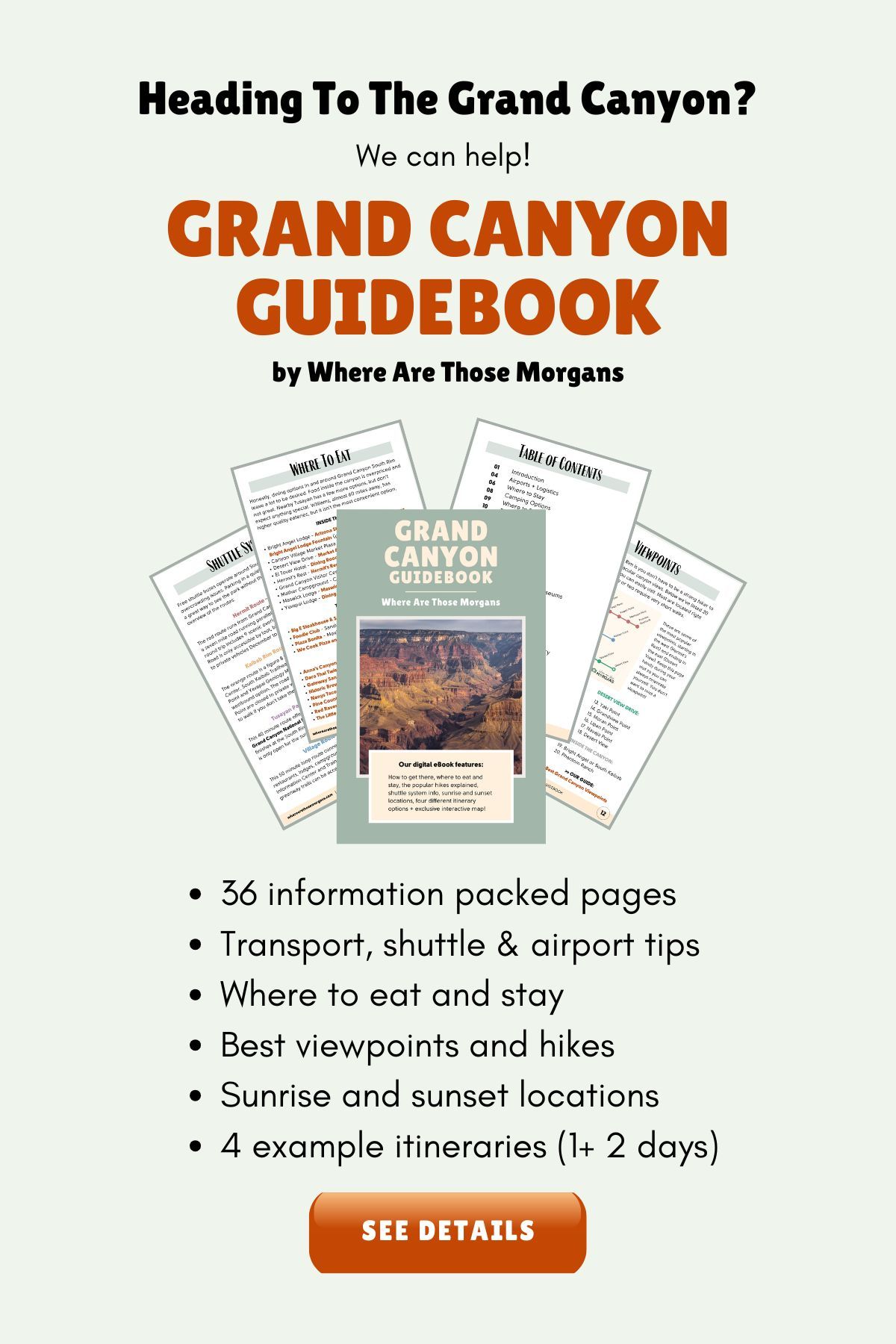
We hope our guide on when to visit Grand Canyon South Rim helps with planning your visit to Arizona!
Please let us know if you have any questions in the comments below.
Happy Travels,
Mark and Kristen
Find this guide helpful? Pin it for your visit!
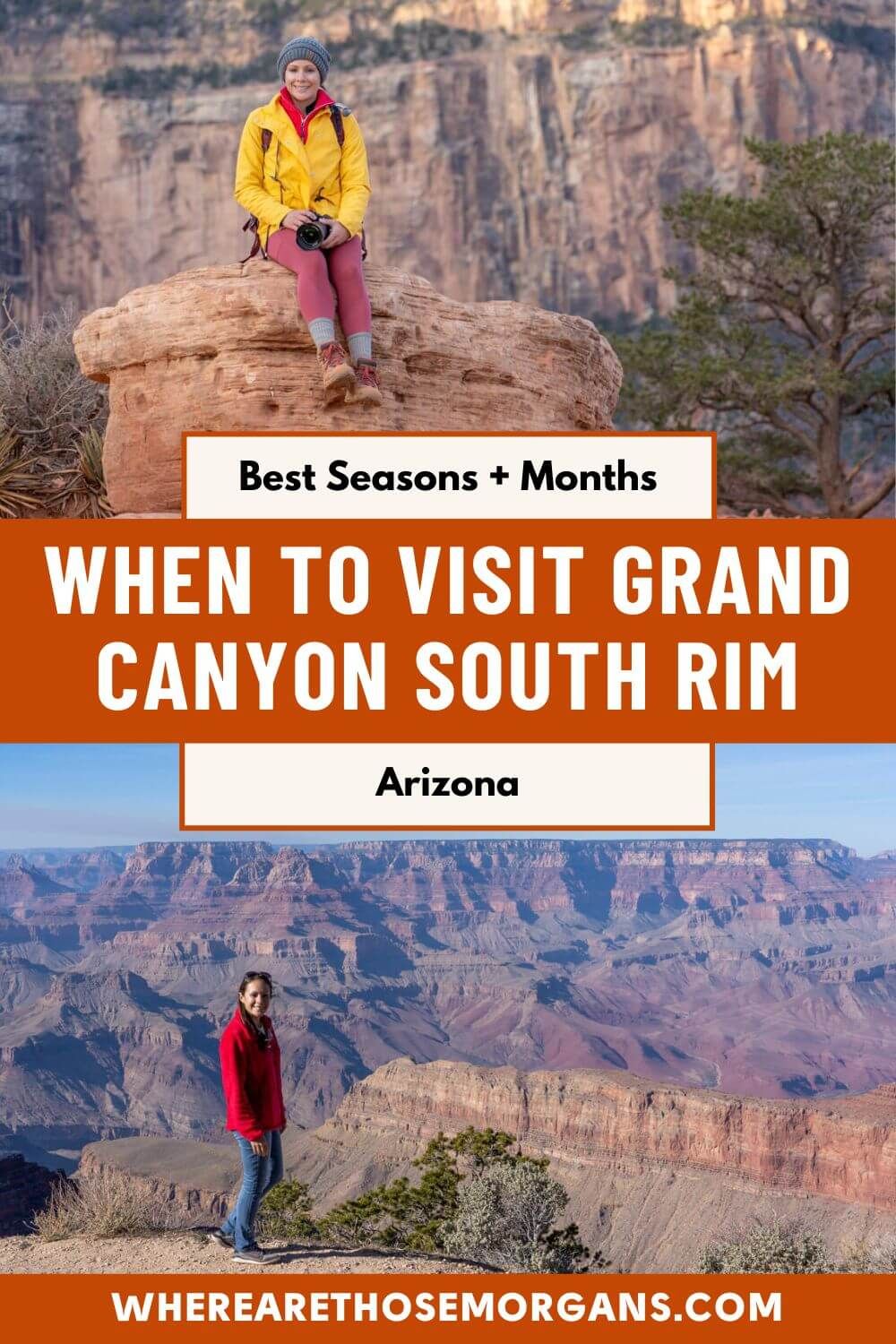
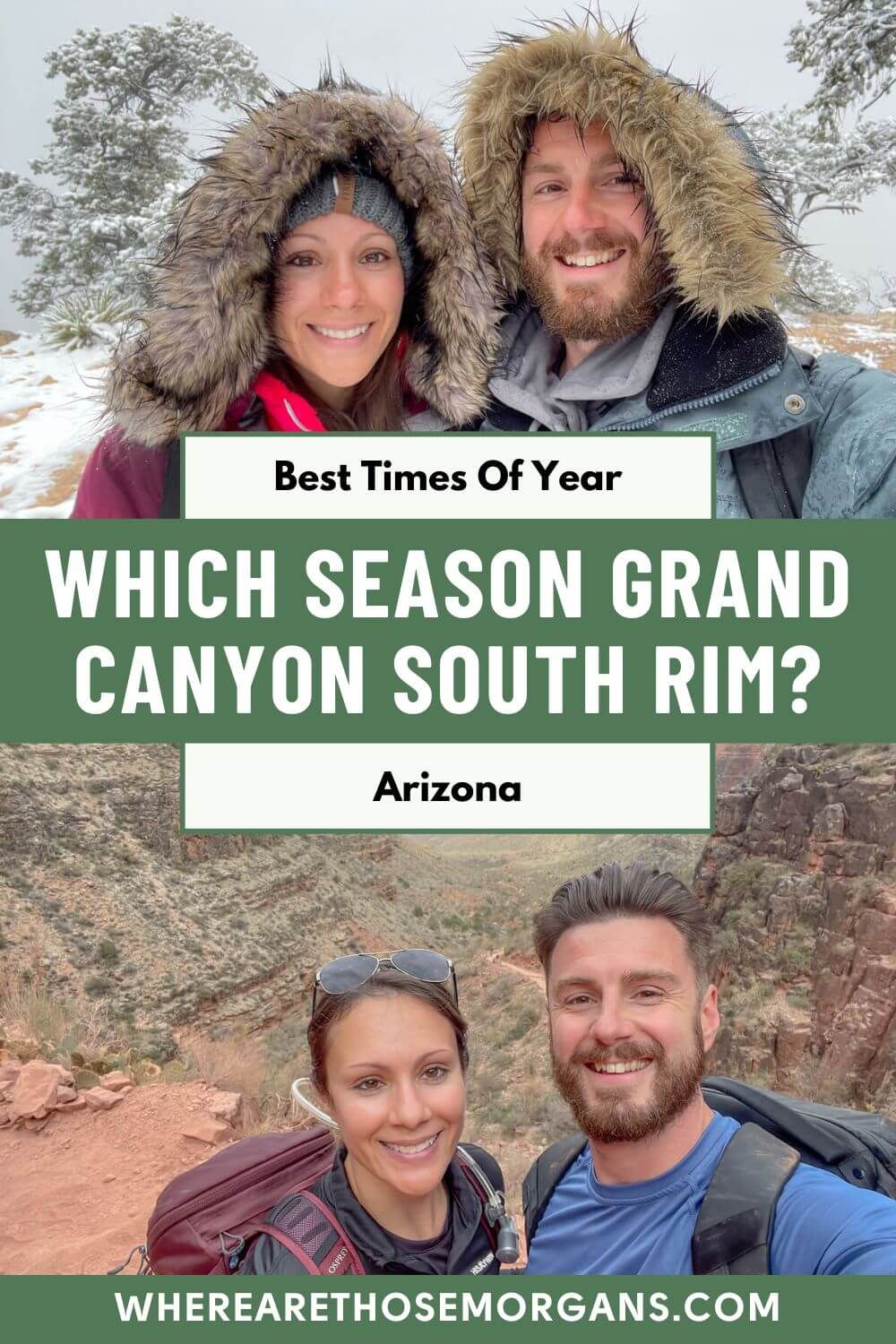
All Rights Reserved © Where Are Those Morgans, LLC. Republishing this article and/or any of its contents (text, photography, maps, graphics, etc.) in whole or in part is strictly prohibited.

